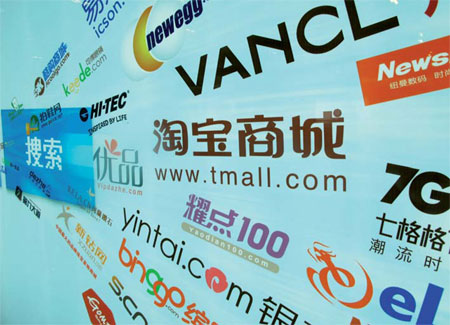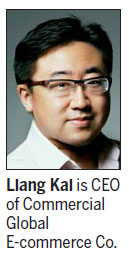Third-party support
Updated: 2012-04-13 08:43
By Lin Jing and Su Zhou (China Daily)
|
||||||||
|
More companies are planning to build their online presence through platforms, offering huge opportunities for e-commerce outsourcing firms. Provided to China Daily |
|
|
Outsourcing firms help big brands find their niche in online retail market
For international brands and retailers, the e-commerce journey in China is something like exploring untested waters. Despite its immense potential, many are still reluctant to take the plunge directly, thereby opening the doors for third-party e-commerce outsourcing service providers.
Qiu Wenbin, chief executive of Baozun, an end-to-end e-commerce service outsourcer based in Shanghai, is one such person who has watched closely the hesitant e-commerce moves made by multinational brands in China. In 2007, Qiu's company tried its best to convince Dutch electronics firm Royal Philips Electronics Ltd to set up an online platform for selling its products in China.
"It was a tough task and nothing much came out of our moves. Philips did not have anyone specific to look after the e-commerce business in China nor were they too convinced about the potential. They did not know why people would buy products and how much they would spend online," Qiu says.
But all of that has changed. E-commerce is booming in China and by current accounts there are more than 70,000 brands/companies that are jostling for customer eyeballs on several online platforms like Tmall.com, the largest business-to-customer (B2C) platform in China operated by Alibaba Group.
Qiu says the presence of big brands on online platforms have helped improve the fortunes of third-party e-commerce outsourcing providers, as more companies are keen on establishing online addresses.
Baozun currently operates 64 online stores on Tmall and posted total sales of more than 1.5 billion yuan ($238 million, 182 million euros) in 2011. The company, however, did not reveal the profit numbers.
Lu Zhenwang, an independent e-commerce observer, feels that the future is bright for e-commerce outsourcers as high expectations from Chinese customers and the desire by foreign companies to cut infrastructure and personnel costs will trigger more demand.
"The online shopping market in China is quite different from the rest of the world. The key drivers are service and timely delivery. Customers are unhappy if the products are not delivered immediately and as such it would be difficult for big brands to undertake these services on their own," Lu says.
With more companies looking to cut costs and maximize returns, third-party companies can handle several aspects like online marketing, orders and distribution, he says.
"For big brands and multinational companies, an end-to-end e-commerce service provider is vital for short-term and long-term growth," Qiu from Baozun says.
E-commerce outsourcers generally provide IT services, customer services, logistics services and interactive marketing services for foreign brands, offline retailers and small- and mid-sized factories that want to establish an online presence.
According to information provided by Tmall, which accounts for more than half of the B2C market in China, since September, the number of e-commerce outsourcers has grown from 100 to more than 300. The number is close to 1,000, if companies in logistics and software development and other allied services are included.
Commercial Global E-commerce Co (mic.cn) was one of the first set of companies that entered the e-commerce outsourcing business. Set up in 2007, the company specializes in providing supply chain management solutions, and provides services to 164 companies on Tmall, including some US apparel brands like Andrew Marc and Dickies.
Liang Kai, CEO of Commercial Global E-commerce Co, says that local e-commerce outsourcers can help foreign companies by providing them with localization solutions. Last year, the company set up three new warehouses in Guangzhou, Jiangsu and Shanghai, with a total area of 128,000 square meters.
These warehouses are expected to boost the company's delivery capacity to 22,000 orders a day. Not surprisingly, business has grown more than 100 percent.
"By cooperating with e-commerce providers, brands and companies can enter the online market more quickly and with lower costs," says Liang, adding that companies can reduce logistics costs by as much as 33 percent by using third-party service providers.
Yihaodian, a company in which US retailer Walmart has considerable investments, and a major player in the B2C segment, has also entered the outsourcing business. In April 2011, it launched the Service by Yihaodian solutions (SBY), a package of e-commerce services for its business partners.
Yu Gang, chief executive of Yihaodian, says such alliances will help foreign companies to sell their products in China without any infrastructural costs like office or personnel, or the need to invest in retail and distribution networks.
Yu says that the market response for outsourcing e-commerce services has been good. After launching its "shopping mall" services in October, nearly 100 vendors on average have joined every week since February.
But there is still a long way to go before companies fully realize the potential of e-commerce outsourcing, experts say. A recent survey from Tmall shows that of the more than 70,000 brands that have online stores in Tmall, only 2 percent have actually availed the outsourcing services. The same survey also indicated that nearly 86.5 percent are keen on outsourcing all or part of their online operations to third-party companies.
The real boom for e-commerce outsourcers will come when more companies ride the online retail wave in tandem with the surge in Internet traffic.
According to IDC data, by the end of 2011, there were more than 150,000 e-commerce service providers in China, including e-commerce outsourcers, warehousing or payment companies. The current online revenue of 120 billion yuan is expected to exceed 1 trillion yuan by 2015.
Waldemar Jap, partner and managing director of consultancy firm BCG Greater China, however, feels that companies should not pin all their hopes to third-party outsourcing.
He warns that on platforms like Tmall, there is hardly any demarcation between companies, thereby preventing the emergence of strong brands.
"Companies on Tmall will have standard formats and similar user interfaces on Taobao. It is difficult for them to build up their own brand image and promote their brand value and culture."
There are certainly other risks about the service. Outsourcers gain their revenue mostly through service fees or transaction commissions, ranging from 10 percent to 40 percent.
"Many traditional companies still consider an online platform as a selling channel, instead of treating it as an integral marketing channel," Lu says. "Some outsourcers are more like distributors and hence brands will have limited influence on online performance.
"Companies should not outsource all their online operations and should consider investing some money on building their own web presence."
Contact the writers at linjingcd@chinadaily.com.cn and suzhou@chinadaily.com.cn

 Relief reaches isolated village
Relief reaches isolated village
 Rainfall poses new threats to quake-hit region
Rainfall poses new threats to quake-hit region
 Funerals begin for Boston bombing victims
Funerals begin for Boston bombing victims
 Quake takeaway from China's Air Force
Quake takeaway from China's Air Force
 Obama celebrates young inventors at science fair
Obama celebrates young inventors at science fair
 Earth Day marked around the world
Earth Day marked around the world
 Volunteer team helping students find sense of normalcy
Volunteer team helping students find sense of normalcy
 Ethnic groups quick to join rescue efforts
Ethnic groups quick to join rescue efforts
Most Viewed
Editor's Picks

|

|

|

|

|

|
Today's Top News
Chinese fleet drives out Japan's boats from Diaoyu
Health new priority for quake zone
Inspired by Guan, more Chinese pick up golf
Russia criticizes US reports on human rights
China, ROK criticize visits to shrine
Sino-US shared interests emphasized
China 'aims to share its dream with world'
Chinese president appoints 5 new ambassadors
US Weekly

|

|








